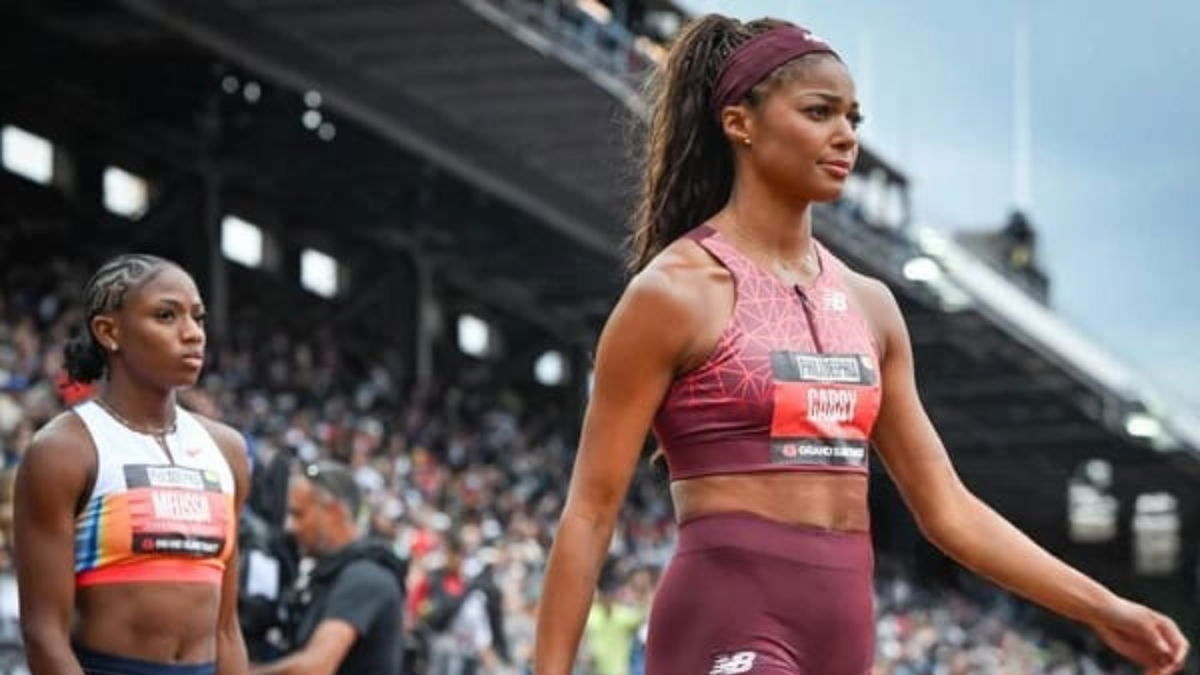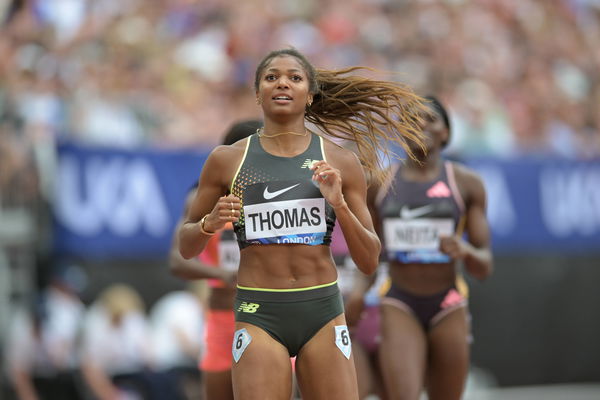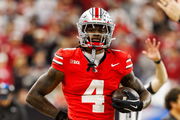
Imago
Imago

Imago
Imago
At a glance, Gabby Thomas is nearly untouchable. An Olympic gold medalist, Harvard graduate, and a rising star in track and field, she commands international respect with poise. Yet even in 2025, excellence is not enough. When Thomas posted a simple courtside photo from the WNBA’s 3×3 Unrivaled league, it triggered an alarming surge of racist attacks.
Watch What’s Trending Now!
Online critics flooded her Twitter replies, questioning her Ivy League credentials and alleging she had not earned her place at Harvard. “Is this real life??” she wrote in disbelief, responding to the avalanche of comments that insisted her diploma was undeserved because she is black.
Thomas did not retreat. Instead, she addressed the incident head-on, using her platform to expose the casual cruelty of online discourse. It was not her first encounter with digital hostility. “I think starting from Tokyo Olympics was my first experience with it,” she said on an episode of The Squeeze. That event marked a shift in how athletes engaged with the public.
ADVERTISEMENT
And how accessible they became to widespread, often anonymous, criticism. “I think, Tik Tok, I am genuinely scared for like the future of social media and people’s interactions. I think the way people interact and how online discourse is on TikTok is so frightening to me. Like where’s what happened to compassion?” said the Olympian, making her shocked state of mind known. However, rather than allow the online negativity to dictate her mental space, Thomas has built an approach rooted in realism and clarity.
“The only choice now is just to deal with reality, and that is that some people are going to be online and they’re going to be mean and nasty and it has nothing to do with me,” said Thomas. She emphasized that genuine criticism never comes from peers or people thriving in their own lives. “Nobody who is on your level or doing better will ever give you negative criticism like that on the internet,” she explained. She also stated that if anybody is genuinely fulfilled and happy, they would not have the urge to bash someone online.
Thomas also reflected on a more subtle strain of public pressure. Constant visibility. Recalling an experience at a meet where she spent over thirty minutes taking photos and signing autographs, she was still vilified online by a single person who felt overlooked. These moments, she said, underscore the strange imbalance between public admiration and personal boundaries.
ADVERTISEMENT

Imago
Gabrielle Thomas of the US wins the women 200m during the Wanda Diamond League London Athletics Meet at the London Stadium, Queen Elizabeth Olympic Park , London, England on 20 July 2024. Copyright: xPhilxHutchinsonx 41390074
Despite the noise, Thomas keeps perspective. “I like social media,” she admitted. “I love Twitter jokes. I love memes. I love TikToks,” said the champion athlete. Her goal is not retreat, but resilience. “I think I have a healthy relationship with the internet.” Surely, in a climate increasingly hostile to nuance, that may be her greatest victory yet. But that might soon fade away as Thomas was recently chased by a heckler, making things take a grim turn.
ADVERTISEMENT
Gabby Thomas Confronts Stalking and Harassment as Fan Behavior Crosses Alarming Lines
In what ought to have been a celebration of athletic excellence, Gabby Thomas found herself cornered not by competition, but by the disquieting persistence of strangers. At the Grand Slam Track meet in Philadelphia, the Olympic champion was not simply recognized. She was pursued.
As she paused to greet supporters and sign memorabilia, a man trailed her movements, raising his voice with personal barbs that transformed a public event into something disturbingly personal. “He followed me around the track while I was taking pictures with fans and signing autographs,” Thomas stated plainly on X. The abuse, according to her, was not casual. It was targeted, unprovoked, and relentless.
ADVERTISEMENT
What unfolded in Philadelphia was not an isolated encounter. In recent months, Thomas has drawn attention to an increasingly visible pattern of intrusion that female athletes face. One that transcends the stadium. On TikTok earlier this year, she disclosed being followed by groups of men at multiple airports, describing the cumulative anxiety that such encounters breed. Though she did not detail every incident, the implication was clear: public presence, amplified by digital platforms, often erodes personal boundaries rather than securing admiration.
Top Stories
Bill Cowher’s Strong Message to Steelers on Firing Mike Tomlin After HC’s Blunt Playoff Message

Andy Reid Fires Coach In Attempt to Rebuild Staff After Receiving HC Requests For Chiefs’ Coordinators

Who Are the Announcers, Referees, & Sideline Reporters for Ole Miss vs Miami? Everything You Need to Know for Fiesta Bowl

Jeremiah Smith Wants to Blame OSU Unit for CFP Loss & Has Urban Meyer’s Backing

Alex Pereira Confirms Major Tracy Cortez Relationship Status Update After Viral Marriage Proposal Clip

Sources: John Harbaugh Wasn’t Fired, Left Ravens After Refusing Major Staff Changes

The Philadelphia incident also casts light on an emerging and troubling intersection. Where the pressure of sports betting distorts fan behavior into something coercive. Gabby Thomas’ experience echoes recent concerns from others in sport, including tennis player Caroline Garcia, who identified “unhealthy betting” as a central factor in targeted harassment. What is manifesting now is not merely poor spectator conduct but a cultural problem, sustained by the illusion that public figures forfeit autonomy once they enter the arena.
ADVERTISEMENT
ADVERTISEMENT
ADVERTISEMENT

